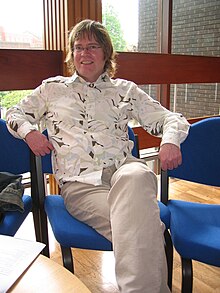Peter O'Hearn
Peter W. O'Hearn | |
|---|---|
 | |
| Born | 13 July 1963 Halifax, Nova Scotia, Canada |
| Nationality | British/Canadian |
| Citizenship | United Kingdom/Canada |
| Alma mater | Dalhousie University, Halifax, Canada Queen's University, Kingston, Canada |
| Known for | Separation logic |
| Scientific career | |
| Fields | Computer science |
| Institutions | Facebook, London, UK University College London, UK Queen Mary, University of London, UK |
| Doctoral advisor | Robert D. Tennent |
Peter William O'Hearn (born 13 July 1963 in Halifax, Nova Scotia, Canada) is a computer scientist based in the United Kingdom.[2]
Peter O'Hearn attained a BSc degree in Computer Science from Dalhousie University, Halifax, Nova Scotia (1985), followed by MSc (1987) and PhD (1991) degrees from Queen's University, Kingston, Ontario, Canada. His dissertation was on Semantics of Non-interference: A natural approach, supervised by Robert D. Tennent.[2]
O'Hearn was an Assistant Professor at Syracuse University, New York, United States, from 1990 to 1995. He was a Reader in Computer Science at Queen Mary, University of London from 1996 to 1999 and was a full professor at QMUL until his move to University College London. He has been the recipient of a Royal Society Wolfson Research Merit Award, a Most Influential POPL Paper Award,[3] and a Royal Academy of Engineering/Microsoft Research Chair.[4] In 1997 he was a Visiting Scientist at Carnegie Mellon University and in 2006 he was a Visiting Researcher at Microsoft Research Cambridge.[2]
Following the acquisition of his startup Monoidics, O'Hearn is currently working for Facebook in London.[5]
Most recently he has been co-recipient (with Stephen Brookes, Carnegie Mellon University) of The 2016 Gödel Prize, for the invention of Concurrent Separation Logic.[6]
O'Hearn has made significant contributions to formal methods in general and separation logic in particular.[7][8]
References
- ^ Olivier Danvy, Peter O'Hearn and Philip Wadler (editors), Festschrift for John C. Reynolds's 70th Birthday. Theoretical Computer Science, 375(1–3):1–350, 1 May 2007. Editorial, pages 1–2.doi:10.1016/j.tcs.2006.12.024
- ^ a b c Peter W O'Hearn, Curriculum Vitae, Queen Mary, University of London, UK.
- ^ http://www.qmul.ac.uk/media/newsitems/se/43028.htm
- ^ http://www.raeng.org.uk/about/fellowship/pdf/newsletter/Spring_News_2012.pdf
- ^ http://www.siliconrepublic.com/start-ups/item/33524-facebook-acquires-assets-of
- ^ http://eatcs.org/index.php/component/content/article/1-news/2280-2016-godel-prize,
- ^ Peter O'Hearn at DBLP Bibliography Server
- ^ Peter O'Hearn, Online Papers, Queen Mary, University of London, UK.
External links
- 1963 births
- Living people
- People from Halifax, Nova Scotia
- Dalhousie University alumni
- Queen's University alumni
- Canadian emigrants to the United Kingdom
- British computer scientists
- Canadian computer scientists
- Formal methods people
- Syracuse University faculty
- Academics of Queen Mary University of London
- British academic biography stubs
- Canadian computer specialist stubs
